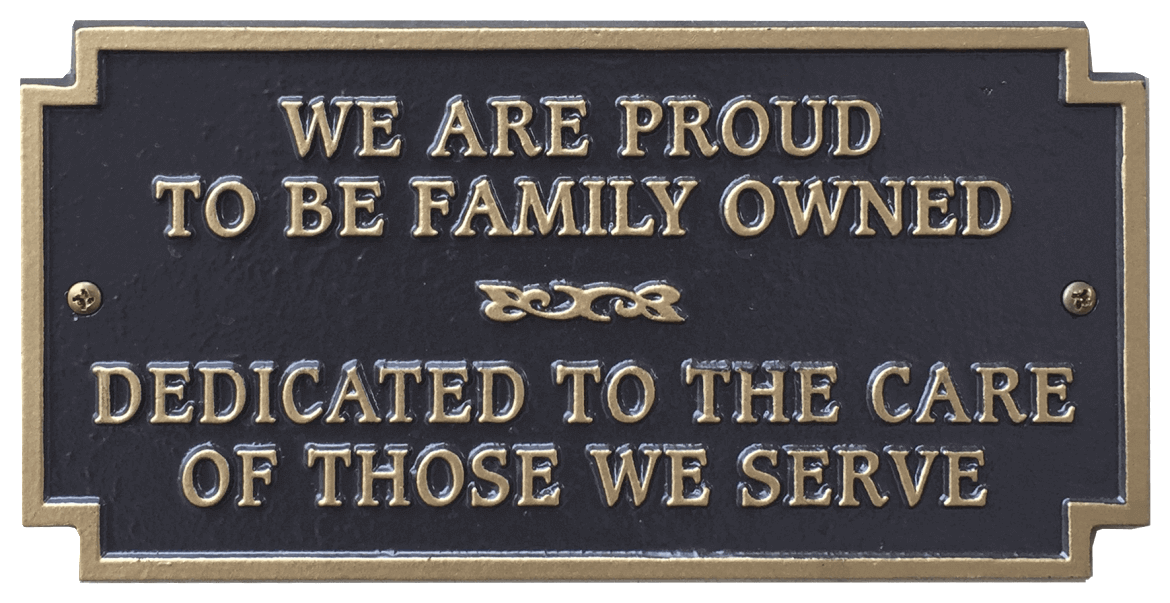When Death Occurs
What to Do When Death Occurs
During the emotionally taxing period immediately following the death of a loved one, many crucial decisions need to be made. You might discover that your emotions are greatly elevated, your thoughts are jumbled, and making decisions seems impossible during the initial hours and days following a loss. Because of these factors, it is highly recommended that you seek the assistance of dependable family members or friends when making all of the upcoming decisions and arrangements.
Furthermore, know that Thomas E. Fickinger Funeral Home's caring staff is ready and willing to help you and your family make the best choices possible during this trying time. We're here to patiently and sympathetically walk you through each step. This page contains information to help you and your family deal with the immediate aftermath of a death.
Give us a call at 814-274-8888 at any time, day or night. We are available to assist.

Contact The Proper Authorities
An authorized medical professional or official must make a formal legal pronouncement of death before any funeral plans and legal decisions can be made. Before anything else can happen, this is a necessary legal step.
If your loved one dies in a hospital, nursing home, assisted living facility, or other medical facility: The medical staff of the hospital, nursing home, or other medical facility will take care of obtaining this official declaration of death if your loved one dies there. To make the legal declaration and finish the required preliminary documentation, they will get in touch with the relevant doctor.
If a loved one passes away at home:
You should contact local emergency services (911) or the relevant authorities right away if your loved one passes away at home and was not receiving hospice care. Before a formal declaration of death is made, emergency medical personnel will arrive, evaluate the situation, and arrange for transportation if necessary.
If a loved one passes away while receiving hospice care, the hospice nurse or doctor can formally declare the death without the need for emergency services to be called by family members. Hospice professionals are qualified to make this announcement and will walk you through the next steps right away.
Before the family can lawfully move forward with funeral planning, moving the body to a funeral home, or managing any legal matters pertaining to the deceased's estate, this official legal declaration of death must be finished and recorded.
Call Thomas E. Fickinger Funeral Home at 814-274-8888 as soon as the death has been formally declared, and we will arrange for your loved one to be placed under our care.
Begin To Make Arrangements
You and your family can start organizing the funeral or memorial services as soon as your loved one has been placed under our care and formally declared dead.
Check for Pre-Planned Arrangements: Your loved one might have purchased a pre-need contract, planned their funeral services in advance, or left written instructions outlining their last desires. Look for any pre-planning documents, funeral home contracts, or written instructions that might be in place before making any further decisions.
Common places to look include:
- Safe deposit boxes
- Home safes or filing cabinets
- With the family attorney
- Important document folders
- Digital files or emails
If pre-arrangements exist with Thomas E. Fickinger Funeral Home, we will have these details on file and can immediately begin implementing your loved one's wishes.
If No Pre-Arrangements Exist: You must choose a funeral home and meet with a funeral director to start going over your options if your loved one did not make any prior arrangements. We will set up an arrangement conference at a time that works for your family when you call Thomas E. Fickinger Funeral Home at 814-274-8888.
Major Decisions to Make: During the arrangement process, several important decisions will need to be made:
- Burial or Cremation: Decide whether you will bury or cremate your loved one's body
- Type of Service: Determine what type of service to hold (traditional funeral, memorial service, celebration of life, graveside service only, etc.)
- Timing and Location: Choose the date, time, and location for services
- Casket or Urn Selection: Select an appropriate casket for burial or urn for cremated remains
- Cemetery Arrangements: Choose a cemetery and burial plot if burial is selected
- Obituary Notice: Draft and submit an obituary announcement to newspapers and online
- Pallbearers: Decide who will serve as pallbearers (if applicable)
- Service Specifics: Determine details including:
- Who will officiate (minister, priest, rabbi, celebrant)
- What music will be played or performed
- Who will deliver eulogies or speak
- Readings, poems, or special tributes to include
- Whether there will be a reception following services
- Video tributes or photo displays
Our funeral director will guide you through each of these decisions patiently and thoroughly, ensuring you understand all your options.
Veterans Benefits: Get in touch with the Veterans Administration right away to find out if you qualify for military funeral honors, burial benefits, headstones, burial flags, and other death benefits or service options if the deceased was an active duty service member, veteran, or retired military personnel. During this process, our staff will help you apply for all benefits that are available. For information on VA benefits, call 1-800-827-1000.
Information Funeral Directors May Need
Once you have met the funeral director, they will advise you on any information or paperwork they need for the death certificate or to proceed with making final arrangements.
Information Required:
- Full name and address
- Marital status
- Race/Ethnicity
- Date and city of birth
- Highest level of education
- Father’s name, mother’s maiden name
- Name of spouse
- Occupation and employer
Documents Funeral Directors May Need
Funeral directors will need important documents to complete any legal paperwork. These documents include:
- Account statements
- Beneficiary designations
- Life insurance policies
- Military discharge papers (form DD 214)
- Social Security number
Taking Care Of Personal Property
There are a few matters pertaining to the deceased's personal life that you must take care of after their passing. Protect your loved one's property first. Verify the security of their house and car. Make the required arrangements for family members or friends to look after your loved one's pet if they have one. A family member who intends to manage the deceased's estate should receive any correspondence that is sent to them. A pile of mail at a vacant house only serves to alert would-be burglars that the house is unoccupied. Don't forget to notify the deceased's supervisor of their passing. Make contact with your loved one to inform them of the death and to cancel any appointments they may have had.

